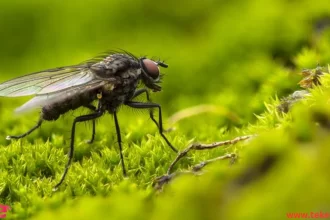Horses are distinctive living creatures that are classified as mammals. They are safe and non-predatory. Horses are distinguished by their beauty, courage and strength in running fast. They are relied upon in races and in traveling across the desert, as well as in agriculture and camps. However, horses may be exposed to parasites that negatively affect their health. The parasites that enter the body of horses may vary, including intestinal parasites and pulmonary parasites, each of which causes many problems for horses that affect their health. Therefore, comprehensive veterinary examinations must be performed on horses to determine the type of parasites present in them to combat them and get rid of them immediately to protect and preserve horses. Therefore, through this article from teketrek, we can learn about these parasites in detail, their causes, symptoms and methods of treatment.
What are the blood parasites that infect horses?
There are many blood parasites that can infect, harm, and affect the health of horses, as they are microscopic organisms that cannot be seen with the naked eye. These parasites vary as follows:
- Strongius major: infects horses from two months of age and above.
- Strongius minor: infects horses from two months of age and above.
- Ascaris worm: infects horses from two months of age to 17 months of age.
- Boots worm: infects horses from two months of age and above.
- Villareids worm: infects horses from 5 years of age and above.
- Lungworms: infects all ages of horses and donkeys.
- Pinworms: infects horses from 6 months of age and above.
- Stomach worm: infects horses from 4 months of age and above.
- Roundworms: infects young foals.

How are parasites transmitted to horses?
There are many ways that lead to the rapid transmission of parasites to horses. We can learn how parasites are transmitted through direct infection and insects through the following:
- Insects: There are some insects that can transmit viruses and microbes to the intestines and stomach of horses, as these insects stick directly to the plants that horses feed on or live inside feed containers, and thus horses become infected with parasites as a result of insect contamination with microbes and epidemics, and these insects such as (mosquitoes – flies – ants – fleas – bugs – cockroaches).
- Direct infection: One of the most important causes of horses being infected with parasites is their direct contact with other infected horses or as a result of living with animals infected with worms, as the infection is transmitted through contact and sleeping in the place of an infected animal, and eating food from the same container from which the animal infected with worms eats, and the infection is transmitted directly to the horse so that the worms reside in the abdomen.
https://teketrek.net/en/dog-flu-symptoms-treatment-and-prevention-tips/
What are the symptoms of bloodworms in horses?
Symptoms are the main guide to determining the type of infection in horses, as the symptoms of horses infected with diseases due to parasites are clear symptoms, and are as follows:
- Noticeable weight loss.
- Diarrhea and vomiting.
- Excessive drooling from the mouth.
- Paleness of the horse’s hair.
- Abdominal swelling.
- High temperature.
- Weakness, laziness, lethargy and inability to move.
- Anemia due to severe anemia.
- Abortion of pregnant female horses.
- The appearance of brown or red urine, and the appearance of bubbles and foam in the urine.
- Drops of blood in the urine.
- Deterioration of health and a feeling of loss of control.
How are blood parasites diagnosed in horses?
After the symptoms appear on a horse infected with blood parasites and worms, the condition must be accurately diagnosed to determine the appropriate and effective treatment in eliminating this health problem, as the diagnosis is made as follows:
- Monitoring the color of urine and feces, as the color of urine and feces reveals many internal diseases present in horses that are not apparent externally.
- Taking a blood sample from the sick horse and examining it under a parasitological microscope by a laboratory specialized in examining blood, urine and feces samples of animals.
- After the test result appears, the type of parasite present in the horse’s stomach and intestines is determined, because each parasite has its own treatment method to expel it from the abdomen and eradicate it permanently.
Effective treatment of blood parasites
There are many treatments that can be provided to horses infected with blood parasites, but determining the type of worms present in the intestines is the main factor for the success of treatment, but common treatments to get rid of worms include the following:
- Antiparasitic drugs such as (ivermectin) should be used, which kills intestinal and tapeworm parasites immediately.
- (Prazquantel) can be used to treat tapeworm parasites.
- (Mix and Dactin) should also be used, which has an extended effectiveness for 16 weeks to cleanse the intestines and stomach of all parasites.
https://teketrek.net/en/london-zoo/
Preventing Parasites: How to Avoid Insects That Carry Parasites
There are some steps that must be adhered to in order to prevent parasites that infect horses and harm their health. The prevention steps are as follows:
- Keep sick horses away from any unclean plants, because they are loaded with insects or the feces of insects infected with diseases and bacteria that enter the intestines of horses and infect them with parasites. Therefore, it is preferable to wash the plants before offering them to horses to eat.
- Give infected horses an antiparasitic according to the dose determined by the treating veterinarian, and the dose is determined according to the age and weight of the infected horse.
- The treatment doses are repeated for two months according to the veterinarian’s prescription.
- Infected horses must be vaccinated with the necessary vaccinations to quickly kill worms and blood parasites.
- It is also important to clean the place where the horse lives with parasites and sterilize it with disinfectants to kill any viruses stuck to it.
- Dispose of the urine and feces of infected horses in places far from where other animals sleep so that they do not become infected.

The importance of periodic tests for early detection of parasites
There is no doubt that early examination and periodic tests play an effective role in treating horses infected with blood parasites more quickly, as their importance is as follows:
- It must Horse manure examination, where a sample of manure is taken in the spring, specifically in mid-April, then that sample is placed under microscopic examination to determine the type of parasites present in the horse’s intestines and stomach.
It is necessary to take more than one manure sample from more than one horse to determine the levels of parasites spread among horses, and to provide treatment collectively.
Treatment is based on the examination and its results, where horses are given treatments and medications based on the type of worms spread and common among them to kill them gradually.
Conclusion
Continuous care to keep horses free of parasites Horses are gentle, sensitive and fun creatures to ride, and taking care of the horse’s health is essential to protect it from any serious complications. Therefore, all horse breeders must establish a special routine to feed horses with clean, healthy and appropriate food, and provide them with large amounts of water to prevent them from dehydration. It is also necessary to pay attention to the sports exercises for horses to stimulate their bodies, enhance their physical fitness and help them resist diseases. It is also necessary to conduct a periodic examination of horses by a specialized veterinarian to protect them from parasites and widespread epidemics. It is also necessary to pay attention to the cleanliness of the horses’ sleeping and living place, while paying attention to the cleanliness of their food and water tools, in addition to the cleanliness of the horse itself and providing a healthy environment suitable for it to preserve and protect it in an integrated manner.





